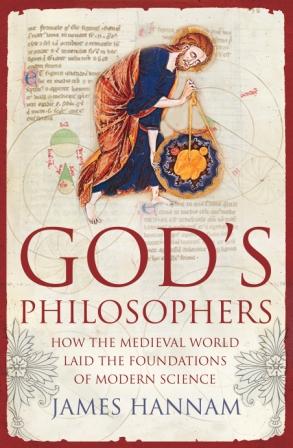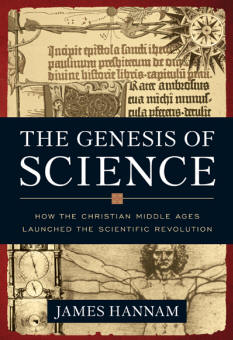
|
If you have enjoyed Bede's Library, you can order my book, The Genesis of Science: How the Christian Middle Ages Launched the Scientific Revolution (US) from Amazon.com or God's Philosophers: How the Medieval World Laid the Foundations of Modern Science (UK) from Amazon.co.uk. |
|
For my latest thoughts on science, politics, religion and history, read Quodlibeta
|
Hitler and Christianity
by Edward Bartlett-Jones
![]()
What were Hitler's religious beliefs?
It is sometimes said that Hitler was a believer in God and specifically that he was a Christian or at least was brought up as a Catholic. After all, weren’t most Austrians, certainly in the late 19th century, nominally Catholics? And what about the frequent references to “God” and “Providence” in his speeches, or to immortality, or the quasi-religious imagery of Nazism?
In contrast to his adult life, relatively little is known about Hitler's childhood and upbringing, and what we do know sheds only dim light on his religious persuasion. His mother was apparently a pious Catholic, according to Hitler's biographers, but Hitler’s own connection with the church during his early youth was not strong. We know he attended a nearby monastery for singing lessons, probably at his father’s behest (Ian Kershaw, Hitler: 1889 – 1936 Hubris, WW Norton, 2000), and that the young Hitler was impressed by the grandiose architecture of great churches. It can reasonably be said that, because of the region in which he was brought up, and the religious faith of at least one of his parents, Hitler was nominally a Catholic. Among his biographers, however, none assert that the boy was even baptized, although it is likely, and there is no evidence of any particularly strong religious element in his upbringing or of feelings of faith like those held by his mother.
So much for Hitler’s early life. What about his attitude to religion and the Church later on? In Mein Kampf (1925) Hitler criticized the Catholic Church in its political form, which he said failed to recognize Germany’s and Europe’s “racial problem”. His Party Charter for the nascent Nazional Sozialistische Deutsche Arbeiter Partei demanded in Article 24, in contrast to strong Christian control of German’s spiritual life, “complete freedom of religion” (in so far, of course, as that was not a “danger to Germany”) (William Shirer, The Rise and Fall of the Third Reich, Arrow, 1991). Indeed, the official “Nazi Party Philosopher”, Alfred Rosenberg, (later to be hanged at Nuremberg), appointed of course with Hitler’s consent, was totally opposed to Christianity. However, Hitler the politician was also aware that to achieve power he would need to win votes from the Catholic Centre Party and could not afford total alienation.
Upon attaining office and enjoying a free hand, what line did Hitler take on religion and the Church? Five days after becoming Chancellor in 1933, Hitler allowed a sterilization law to pass, and had the Catholic Youth League disbanded (Shirer, The Rise). The latter was a measure applied to other youth organizations too, in order to free up young people to join the Hitler Youth. At the same time, Hitler also made an agreement with the Vatican to allow the Catholic Church to regulate its own affairs. (It is probably worth noting here the low value that Hitler placed on written agreements.) Parents were pressured to take their children out of religious schools. When the Church organized voluntary out-of-hours religious classes, the Nazi government responded by banning state-employed teachers from taking part. The Crucifix symbol was even at one point banned from classrooms in one particular jurisdiction, Oldenburg, in 1936, but the measure met with fierce public resistance and was rescinded. Hitler remained conscious of the affection for the Church felt in some quarters of Germany, particularly Bavaria. Later on, though, a wartime metal shortage was used as the excuse for melting church bells (Richard Grunberger, The Twelve Year Reich, Henry Holt, Henry Holt, 1979 and Richard Grunberger, A Social History of the Third Reich, Penguin, 1991).
Hitler’s references to providence and God and the ritualistic pageantry of Nazism were more than likely pagan than Christian. Earthly symbols of German valour and Teutonic strength were to be worshipped - not the forgiving, compassionate representative of an “Eastern Mediterranean servant ethic imposed on credulous ancient Germans by force and subterfuge” (the phrase is Burleigh’s own, in Michael Burleigh, The Third Reich: a New History, Pan, 2001). A Hitler Youth marching song (Grunberger, A Social History) illustrates it:
- We follow not Christ, but Horst Wessel,
- Away with incense and Holy Water,
- The Church can go hang for all we care,
- The Swastika brings salvation on Earth.
(Horst Wessel was an early Nazi party Sturmabteilung street-fighter murdered by communists and turned into a martyr by propaganda chief Josef Goebbels.)
The SS were particularly anti-Christian, and officers and men were encouraged to leave the Church, although those that refused to renounce their Christian faith were not visibly punished, perhaps because their otherwise faithful adherence to SS codes of behaviour gave the lie to any claim of true Christian affiliation. The SS also brought in its own neo-pagan rituals for marriage ceremonies and baptisms.
At this time then, the only alignments between Nazism and Catholicism were the Church’s perceived anti-Semitism and anti-communism, and an abhorrence of abortions by healthy pregnant German women (although Hitler did diverge from the Church once again in 1939 when he authorized the medical extermination of mentally and physically handicapped children). As the war progressed and the Wehrmacht gained control of large parts of the Soviet Union, the question of the suppressed Russian Orthodox Christian sects surfaced. Hitler’s response was to leave them to their own devices “so they can beat each others’ brains out with their crucifixes”. He also had contempt for European Protestants: “as submissive as dogs” (Shirer, The Rise). In the debate about his spiritual leanings, Hitler is also sometimes alleged to have flirted with the occult, although in fact it was far more a passion of Himmler’s. For instance, Hitler loathed astrologers. Others close to him, such as Goering, were also dismissive of Himmler’s obsession with the supernatural and Hitler would no doubt have enjoyed Goebbels' joke, during one clampdown on eccentric religious types, that it was “odd that not a single one [of a group of arrested clairvoyants] predicted he would be arrested”. Goebbels would later try to rally Hitler in his bunker at the end of the war with astrological charts predicting victory but Hitler was still unmoved.
At times, Hitler was more pragmatic about religion: “If my mother were alive, she would definitely be a churchgoer, and I wouldn’t want to hinder her. On the contrary, you’ve got to respect the simple faith of the people”. If Hitler was motivated by a supreme being, or convinced that his success was providential, it is hard to see that he was referring to the same God worshipped by Christians. These elements of his orations were dramatic and poetic figures of speech, and the immortality he stood for was of the earthly type, in which heroic legends and monumentalist architecture alone would preserve a great name or event for generations. This analysis stands entirely apart from the actions committed in Hitler’s name which shatter any pretence of Christian leaning. In conclusion, it is reasonable beyond doubt to say that Hitler was not at any stage of his life a Christian.
Bibliography
Ian Kershaw, Hitler: 1889 – 1936 Hubris, WW Norton, 2000
William Shirer, The Rise and Fall of the Third Reich, Arrow, 1991
Richard Grunberger, The Twelve Year Reich, Henry Holt, 1979
Richard Grunberger, A Social History of the Third Reich, Penguin, 1991
Michael Burleigh, The Third Reich: a New History, Pan, 2001
George Stein, The Waffen SS: Hitler’s Elite Guard at War 1939 – 1945, University of Cornell, 1984
Gerald Reitlinger, The SS: Alibi of a Nation 1922 – 1945, Arms and Armour Press, 1981
Charles Sydnor, Soldiers of Destruction, Princeton University Press, 1977
Michael Burleigh (ed.), Confronting the Nazi Past, Collins and Brown, 1995
Joachim Fest, Hitler, Thomson Learning, 1994
Alan Bullock, Hitler: A Study in Tyranny, Penguin, 1990
William Sheridan Allen, The Nazi Seizure of Power, Penguin, 1995
![]()
The author of this article is an agnostic and an amateur historian of 20th Century German history.

